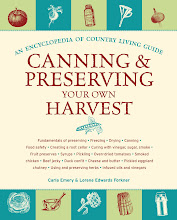If your neck of the woods is anything like mine, then the first storm of the winter always hits unexpectedly. I can't forget being snowed in for a week last Christmas if I try, or the winter before last when the wind blew down full-grown trees and left me without power for six days. In honor of the encroaching winter months, here is a guide to surviving the unexpected courtesy of Carla Emery and the Encyclopedia of Country Living:


Vehicles: In the trunk of your car, keep a few blankets, a warm coat, walking shoes in summer, and warm boots suitable for hiking in the worst weather in winter.
Medical: In general, store aspirin, bandages, antibiotic ointment, and a supply of your regular prescription items, plus personal sanitation supplies. Medical tip: Unscented sanitary napkins are excellent compresses for a bleeding wound.
Food: Eat up all the stuff in your refrigerator first. After that, eat canned goods. Don't open the freezer unless power will be out more than three days. (It may stay frozen that long if unopened.) If power is going to be out longer and you have a way to cook, you can cook everything practically instantly and preserve it by canning. Canned goods are the backbone of an emergency food supply because they're precooked, store without refrigeration, and can be eaten without being heated. You'll need an average of 3 cans per family member per day of your emergency. So figure the worst that could happen, and store twice that much. It'll be a lot of cans. Store foods your family likes to eat, so that once a year or so you can use them up in your regular diet and replace them with fresh ones. Full-meal cans of food such as beef stew, chicken and noodles, or canned spaghetti dinner are handy for emergency food. Kids will weather this sort of emergency easiest if their emergency food supply is basically familiar foods. Assume clean water will be precious unless you have a private supply, so store a week or two's supply of disposable plates and silverware.
Water: The basic rule of quantity for long-term drinking water storage is 1⁄2 gallon per family member per day, usually stored in gallon plastic jugs. Rinse them and change the water once every 6 weeks or so if you're using plastic. If you store water in glass gallon jars, it needs to be changed for freshness only about once every three years. Save more water for washing and flushing. If you know a disaster may be coming, fill all the sinks, the bathtub, and any other sizable containers - such as clean plastic garbage cans - with water. Then you'll have that plus your regular stored water. NOTE: Don't drink the water from a waterbed, even in an emergency. An algaecide in that water is poisonous. Don't drink swimming-pool or pond water unless you boil it for 5 minutes before drinking it or add iodine tablets (purchase from a pharmacy or campers' supplier).
Diapers: If you have children in diapers and usually use cloth diapers - which require a lot of water for washing- you might want to keep a supply of disposables in your emergency box, too.
Toilet: Where do you live? If you live out in the woods, you can go out behind a tree if need be. If you live in an apartment, that isn't an option; you could purchase a chemical toilet ahead of time against such an emergency, plus a supply of heavy-duty plastic trash bags to empty it into. Either way, store 1 roll of toilet paper per family member per week you are preparing for.
Light: Always keep on hand a way of making light if the electricity goes off. All the adults in the house should have a few candles, a candleholder, and a box or book of matches right with them in their rooms, situated so that the candle could be lit and mounted in a firm position even when struggling to see in the dark. In addition to the candles, a few kerosene lamps, Coleman lanterns, "barn lights," or other such devices would be helpful. How Many Candles? You almost can't have too many. The general rule is to store at least three candles per day you are storing for, or 21 per week; but it's good to have more. Fat ones burn down more slowly than thin ones.
Smoke Detector: Since you might be burning all those flames to help you cook and see, better also make sure you have a battery-powered smoke detector.
Heat: Plan a way of heating and cooking without electricity, and store a fuel supply for that system. For most people, that backup is a wood burner, even a fireplace. But fireplaces are not heat-efficient and are tough to cook on, so a wood stove, properly installed with a stovepipe, is better. Keep a supply of newspapers and kindling for starting fires and wood for burning, or you'll be burning your furniture if it's that or freeze. To keep the fire going for heat and bottle warming, you have to train yourself to wake up and put more fuel in the stove when needed. NOTE: You absolutely cannot use charcoal grills or hibachis to heat a house. They give off carbon monoxide, a colorless, odorless, poisonous gas that has killed a lot of people who tried that. A propane or gasoline camp stove can be used in the house, and propane stores well.








No comments:
Post a Comment